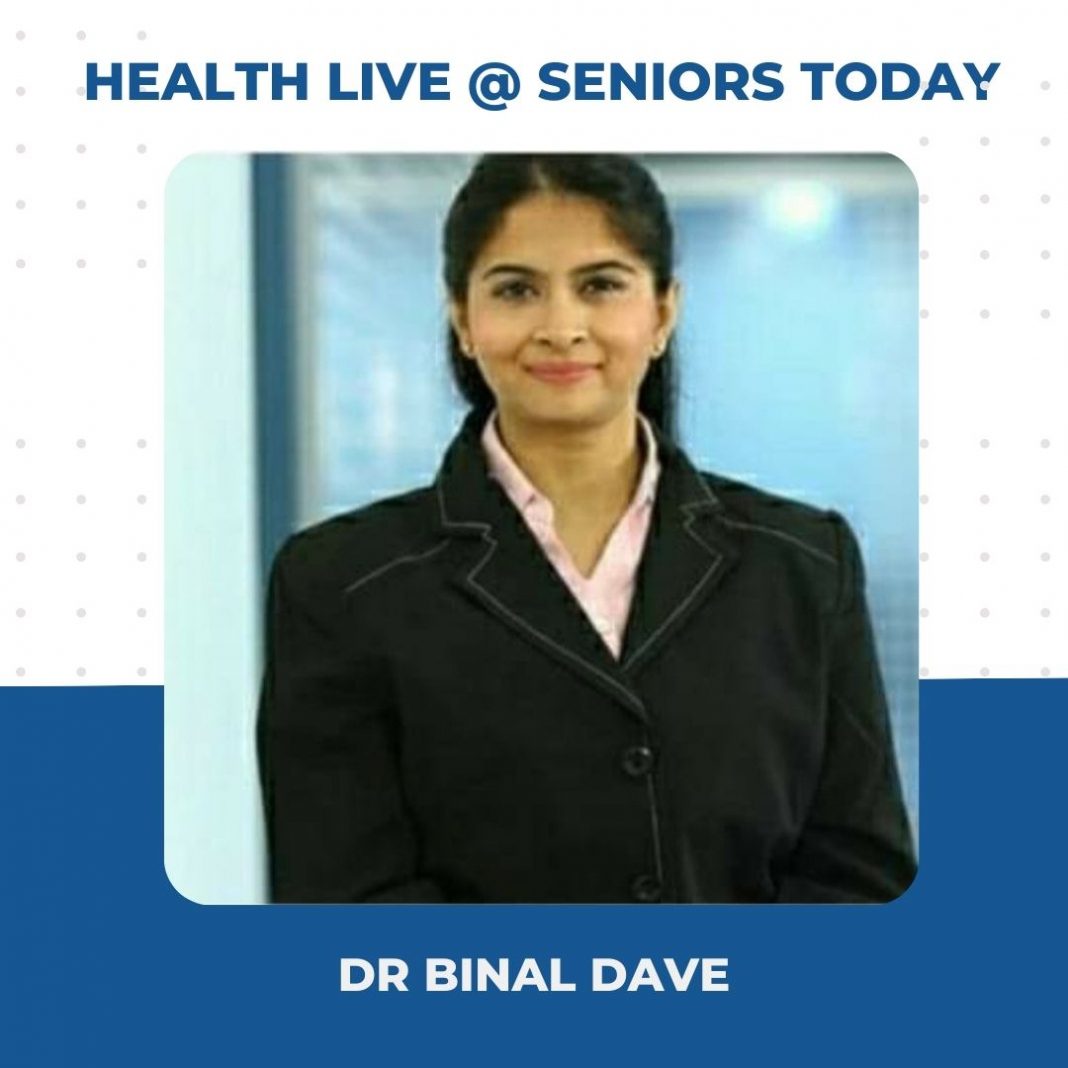On April 17, Seniors Today hosted its weekly Health Live session with Dr Binal Dave, a leading orthopaedic and women’s healthcare physiotherapist. The topic for this week’s session was- Geriatric to GeriActive: Physiotherapy Lessons for Seniors in the Lockdown (and in general)
Dr. Binal Dave is a Senior Physiotherapist and a specialist in Geriatric Care, Women’s Health and Rehabilitation and Aquatic Therapy. She has also done a Certificate on Female Sex Health Rehab, Certified Manual Therapist, Mat,Prop and Reformer Pilates Teacher Trainer, Geriatric Care Expert,Kinesio Taping practitioner,Certified Myofascial release Practitioner
Currently, Dr. Dave says they are focusing mainly on post-Covid rehabilitation because the signs and symptoms and the complications of post-Covid are also a worry, which slowly sets in and triggers the various systems in the body in the form of fatigue, breathlessness, cough and overall systemic changes. So, overall activity, immunity, diet and lifestyle modification are the key in this new normal that we are trying to figure out.
– Geriatrics is the care of the aged.
– Active ageing- the process of optimising opportunities for health participation and security in order to improve your quality of life as you age.
– WHO classification:-
- Young old- 65-74 years
- Middle old- 75-84 years
- Old old- 85+ years
– Some myths associated to old age:
- People lose their memory as they age- false. There is a difference between forgetfulness and dementia. Forgetfulness is a normal ageing process whereas dementia is a chronic brain disease which leads to memory loss.
- Elderly shouldn’t exercise as they might fall
- Elderly cannot purse their passions
Dr Dave went on to explain the facts to break the myths as the session progressed, please read on to find out.
– Changes in the musculoskeletal system:
- Muscle atrophy
- Joint stiffness
- Decreased bone density (women > men)
- Alteration in posture
- Difficulty in transfer activities impaired gait
– Conditions related to musculoskeletal system:
- Arthritis- most common
- Osteoporosis
- Fractures
- Infections
- Frequent falls
– Recommendations to improve your bone health:
- Regular exercises for 20 mins. For example- marching while sitting on your chair
- Aquatic therapy- your body weight is reduced by 1/10th in the water and the properties of water will improve your muscle strength, bone health, cardiovascular system and so on. Core strength and activity is achieved best by aquatic therapy
- Bone density scan, Vit D, calcium and uric acid blood profiling should be done regularly.
- Maintain mobility
- Use toilet seats and chairs with arm rests, use a walker for added support
– Some self-chair exercises:
- Heel raises while sitting
- Toe raises in sitting position
- Take your step out with a band
- Sitting marching
- Tie ankle weights around and straighten and bend your knee
– Changes in the nervous system:-
- Impaired balance and coordination
- Cognitive disturbances such as Alzheimer’s and dementia
- Diminished reflexes
- Frequent falls
- Change in the posture will lead to wide based gait which reduces the arm swing
– Conditions related to the nervous system:
– Stroke- remember the acronym FAST
F- Face- all of you can smile, and check for any discrepancy
Arms- raise your arms above your head and see if there is any drifting down of one or both the arms
S- Speech- try saying the phrase “I am the happiest today” out loud
T- Time- every second counts, if any of the above three mentioned points do not seem right, seek immediate medical advice
– Parkinson’s disease- stooped posture, rigidity, flexed elbows and wrist, forward trunk posture, bent knees, shuffling or short steppage gait
– Alzheimer’s disease- memory loss, can’t solve problems, confusion with time and place, difficulty in determining colour, difficulty in completing certain tasks
– Recommendations to improve your brain health:
- Brain games such as chess, Sudoku
- Aquatic therapy
- Healthy habits and diets
- Exercising
- Maintaining social and family bonding
- Stress management
- Staying hydrated
– Changes in the cardiovascular system:
- Valves of the heart become thick and rigid because of the cholesterol
- Blood vessels thicken and result in elevated blood pressure
- Decline in the pumping capacity of the heart
- Atherosclerotic changes in the blood vessels
- Hypertrophy of heart muscles
– Ways to prevent falls:
- Wearing proper and correct eye glasses
- Eye exercises
- Working in a well-lit room
- Regular eye check ups
- Use night lights when you have to
- Install a few rugs
- Use smart phone devices and fall detectors
- Use non- slip mats, tall toilet seats
- Minimise clutter
- Stay physically active
– Ways to maintain and manage your diet- your diet should contain
- 55-65% carbohydrates
- 15-20% proteins
- 20-25% fats
– Changes in the genitourinary system:
- Ageing increases the risk of bladder, kidney and bowel problems such as urinary incontinence, leakage of stool or urine, inability to hold urine, urinary retention, bladder and other urinary tract infection.
– How does pelvic floor rehabilitation help?
Like any other muscle in the body, pelvic floor muscle in the body is also just as important and can be trained with regular and targeted exercises.
Pelvic floor muscle exercises can help with
- Improving your bladder and bowel functions
- Better recovery from prostate surgery, childbirth
- Increases social confidence
- Improves the quality of life
– How can rehabilitation help in post-Covid symptoms?
- It improves the lung capacity
- Improves your balance and coordination
- Reduces risk of fall
- Reduces fatigue and stress
- Reduces joint pain and discomfort
- Facilitates early return to normal
– How can you avail help?
- Tele rehabilitation
- Clinical e-assessments
- Clinical e-therapies
- Aquatic e- therapies
– While exercising, the focus should be more on the mobility of the joint and bone health.
– In the senior citizens, the calcium deficit is seen mostly in the lumbo-pelvic region and the lower lumbar region, wrist- hand complex, foot- ankle complex and the neck region, hence you should focus on exercising throughout the week, 3-4 times a week for 20-25 mins, focusing on these areas.
– While focusing on exercises for bladder control, we need to keep in mind and focus on the 3 types of fibres of muscles which are the skeletal muscle fibres, fast muscle twitch fibres, involuntary muscle fibres- and all of them have a different role to play. This is thus including pelvic floor exercises with slow and controlled contraction and relaxation, fast contraction and relaxation and we ask you to reproach your pelvic floor in all functional movements.
Sarcopenia is the muscle and bone loss which comes with ageing. It has been proven through research that aquatic exercises are the best to improve sarcopenia. Sarcopenia can be diagnosed through dexa-scan, x-rays, MRI. It is the overall bone health that we need to access along with the vit D profile.
The aquatic therapy and exercises, due to the current situation, can be moved from the aquatic environment to the land environment.
Some exercises to strengthen the knee- you need to focus on core muscle strengthening, hip muscle strengthening, muscles around the knee and ankle. There are a series of exercises that can help you for the same. You can reach out to us and we can connect you to Dr. Dave for a tele-session.
There are oro-motor exercises o improve your swallowing plus a good assessment is required before any exercises are suggested. Any neurophysiotherapist can assess you and give you tailor made exercises for your complaints keeping your condition in mind.
A few “don’ts” to keep in mind with hernia-
- Avoid heavy weight lifting and abdominal exercises.
- Correct breathing technique is very important if you have abdominal or umbilical hernia
Exercises for frozen shoulder and some things to keep in mind- there are stages based on the severity, duration and the comorbidities associated. It is a series of exercises; you have to focus on your core muscle strengthening along with your neck, shoulder, and elbow and wrist exercises. You should start with shoulder and neck mobility exercises. They we improve the strength of your muscles around your shoulder girdle, the scapula and so we proceed from there. From the strength we move to the endurance and then make sure that the pain and discomfort does not come back.
Aquatic therapy works best for neurological impairments. Aquatic therapy along with sensory integration is advised in such situations.
You can go to a massage therapist, they are called deep tissue massage therapists and you can go to them and get a massage but with proper precautions.
There are a series or 21 exercises which can be done for varicose veins.
Dr Binal Dave can be reached via email at binald@aquacentric.com, and on phone at +91 9833000468




